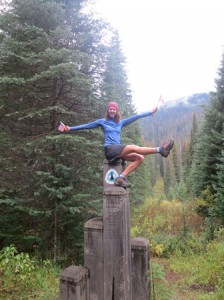
Westborough – On Oct. 28, Wendy Johnston spoke to an audience of nearly 40 people at the Westborough Public Library about her experience hiking the Pacific Crest Trail (PCT). The trail has received a lot of attention recently thanks to Cheryl Strayed’s bestselling memoir “Wild,” something Johnston acknowledged as a probable reason for so many people attending the talk. Johnston isn’t bitter about it, though – the book’s success has given her the chance to share her own PCT story with a wider audience.
The journey on the PCT isn’t one undertaken lightly. The route stretches approximately 2,700 miles from Campo, Calif., a town on the U.S.-Mexico border, to Manning Park, British Columbia, a park on the U.S.-Canada border, across the deserts of California, through the mosquito-infested forests of Oregon, and over the snow-capped peaks of Washington. It takes the average hiker five months to complete; many never finish due to early snowfalls in the northern Cascades.
Johnston had wanted to hike the PCT for years, but she wasn’t sure how to ask for six months off from her job ? a job that, incidentally, she hated. That’s when fate intervened: Johnston was laid off, giving her the opportunity she had been waiting for to finally go after her goal.
From April 19, 2013 to Sept. 17, 2013, Johnston marched north on the PCT. It wasn’t easy. A heavy backpack weighed her down; the looming deadline of a friend’s wedding kept her moving, even when she wanted to rest; and a contaminated water cache left her with giardia, which later turned into a much worse infection.
It might come as a surprise to hear Johnston claim that “hiking these trails [was] pretty easy” compared to her normal life. Having grown up with an abusive mother, Johnston found a sense of security on the trails that she had never felt at home. On the PCT she found a community, a “shared vulnerability,” in her fellow hikers. Hiking was a cathartic experience, a chance to shed the negativity and doubt that had accumulated over her lifetime.
“I hike these trails because they are where I find my self-worth,” Johnston reflected. “I discover who I am without my story.”
After the talk, Johnston played a slideshow of photographs she had taken on the trail. A question-and-answer session with the audience followed. One man, who said he was planning on hiking the Appalachian Trail, asked if she had any advice for him. Johnston looked down, deep in thought. After a few seconds, she gazed out at the audience with steady resolve.
“You have to hike your own trail,” she answered.

















